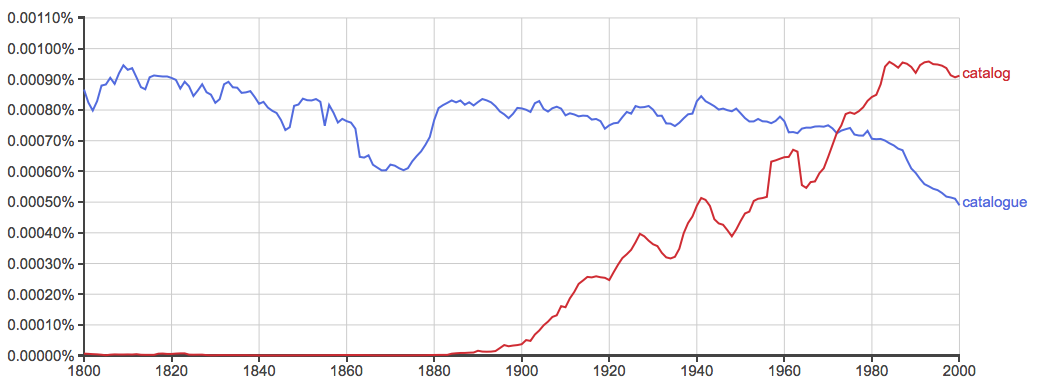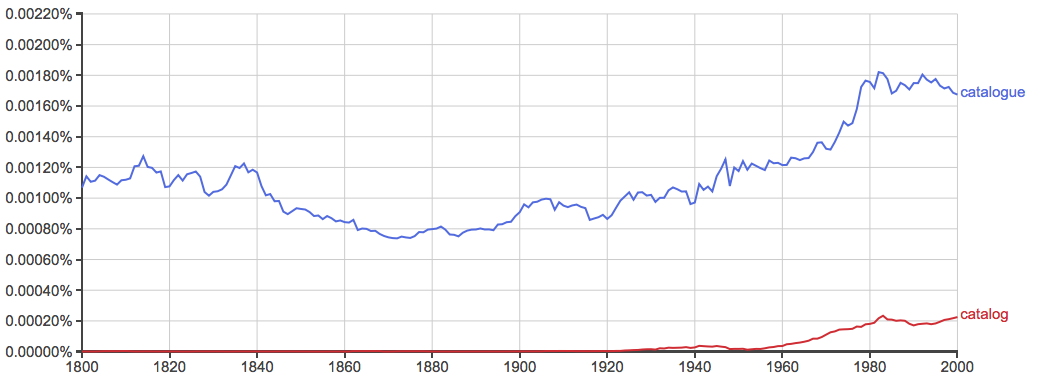As you read English, you will notice that some words can be spelled multiple ways. Catalogue, for instance, is sometimes spelled without the -ue, forming catalog instead.
This -ue ending derives from Greek suffixing conventions. Since English borrows many words from Greek and other languages, it’s not surprising that this suffix made its way into modern English, as well.
But as English evolves, so do spelling conventions, and in some parts of the world it is common to end such words at the G. You should read this article to find out exactly which parts those are.
What is the Difference Between Catalog and Catalogue?
In this article, I will compare catalog vs. catalogue. I will provide example sentences for each spelling to illustrate when it’s appropriate to use one over the other.
I will also discuss a useful memory tool to help you decide whether to use catalog or catalogue when you write.
When to Choose Catalog
 What does catalog mean? Catalog is sometimes a noun, and sometimes a verb.
What does catalog mean? Catalog is sometimes a noun, and sometimes a verb.
When catalog is a noun, it refers to a complete list of items, like the mail-order advertising pamphlets sent to millions of American homes on a regular basis.
When catalog is a verb, it means to list items in systematic fashion.
Here are some examples,
- Pa used to the pages of the Sears catalog as toilet paper in the outhouse. (Noun)
- The clerk read out the list of charges like a catalog of cardinal sins. (Noun)
- Beauregard told his assistance to catalog of the documents in the storage closet. (Verb)
- These brightly painted sculptures cataloging styles of Southern houses are accompanied by short texts, or “legends,” as the artist called them, that document their histories and the lives of their inhabitants. –The New York Times (Verb)
As you can see from the chart below, catalog became the standard spelling of this word in American English only relatively recently—around 1970.

Since this chart only examines data from books written in English since 1800, it is not scientific, or terribly precise. Still, it is a clear indicator of a long-term usage trend.
When to Choose Catalogue
 What does catalogue mean? Catalogue is the standard spelling of the same word in British English. It is also a noun and a verb, and can be used in all of the same contexts as catalog.
What does catalogue mean? Catalogue is the standard spelling of the same word in British English. It is also a noun and a verb, and can be used in all of the same contexts as catalog.
For example,
- The new boss of Argos, John Rogers, is planning a remarkable nationwide tour in an attempt to boost staff morale and improve customer service at the catalogue retailer after it was bought by Sainsbury’s. Rogers will visit eight shops a day for five days in the run-up to Christmas. –The Guardian

Catalogue has enjoyed clear preference in British English since at least 1800. That being said, the same limitations that applied to the first chart apply to this one, as well.
Trick to Remember the Difference
Both of these words can appear as nouns or verbs. Thus, you will have to consider your intended audience when deciding between catalogue and catalog.
Catalog is standard in American English, where catalogue is standard in British English. To avoid confusion, you should choose catalog for American audiences and catalogue for predominantly British audiences.
If you are having trouble remembering this, here is a helpful trick to remember catalogue vs. catalog.
Since catalogue shares a U with United Kingdom, you should have no trouble remembering that it is the British variant.
Summary
Is it catalog or catalogue? Catalog and catalogue are two spelling variants of the same word, which as a noun means a list of items, and as a verb means to make such a list.
- Catalog is preferred in American English.
- Catalogue is the British spelling.
Since catalogue and United Kingdom are each spelled with a U, you can use that letter as a mnemonic device to help you remember which version is which.
There will always be confusing words in English, and no writer can hope to memorize all of them. When you need help with writing, be sure to check this site for practical explanations that are easy to understand.
Contents
